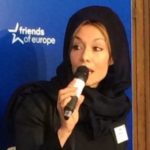In recent years, there has been a growing interest in an undeniably political theme in Europe: the politicization of Muslim women’s bodies through the visibility of the so-called "Islamic" headscarf in the public space, which is often considered an affront or even a threat to Western values.
As mentioned in my previous opinion piece, Headscarf ban: Belgian Muslim women are resisting in order to free themselves, and for more than 20 years now, the endlessly repeated and unsuccessful discussions on the “politicization of the veil”[1] have had a long history in European politics. Women's bodies are a battleground in times of crisis, especially in the current context of ethnic and religious pre-eminence.
Indeed, the racial and religious question, which is eminently political, guides the forms of mobilization and socio-political actions of so-called “racialized” women of the Muslim faith.
In this deleterious and exacerbated post-9.11 political context towards Islam, a new profile of both feminist and Muslim women is emerging, whose confusing, disturbing and yet inclusive rhetoric will challenge the normativity of a dominant feminist thought in the West.
Yet this identity of “hybrid” and subversive women indeed inspires a generation of Muslim women today: women who have chosen to be politically and religiously autonomous and free in the face of an unequal society that undermines them, whom they denounce and challenge in a critical, determined and persistent dialogue.
From then on, they acquire social, political and religious legitimacy while shattering the “conventional wisdom” to which one would like to assign them.
In “A Muslim feminism - and why not?”[2] (preface by Alain Gresh), which was reissued last March 2020, we are committed to updating the history and memory of these movements, while returning to the political, religious and conceptual issues they raise in the academic, religious and civil society fields.
On the other hand, the book aims to shed light on those who carry this struggle, and who have appropriated spaces for contestation and negotiation from the religious spheres to the so-called mainstream feminist movements.
Like contemporary feminism in the West, Muslim feminisms have been crossed by different currents of thought and have conveyed ideas for decades. However, it is only very recently that these movements have been made visible in the French-language media, where the demands of these activists of a new kind resonate. In recent decades, they have contributed to this theoretical and practical revolution and shift in focus, while at the same time initiating an unprecedented shift towards diversity.
In recent years, the underlying conceptual framework of Muslim feminism has given feminist thought and each of us the opportunity to question our own blind spots. It has unquestionably become one of the fashion terms that mobilize the heart of Muslim women’s associations, as it is rather (de)politicized and dynamic while allowing a non-binary and rather solidarity-based approach between women from different backgrounds, as well as remaining in tune with our era marked by identity hybridities.
Over the last 5 years, we have truly witnessed the emergence of a Muslim post-feminism which has resulted in the political and intellectual maturation of Muslim women in terms of ideas, and which has opened new windows of hope in this quest for freedom beyond the need to mobilize the religious frame of reference.
They are no longer “prisoners” of the pre-eminence of their religious identity, which according to some polarizes and engages in the promotion of a “2.0 Muslim feminism” that is above all concerned with intersectional solidarity. They advocate for a more inclusive and promising feminist movement, recognizing the constitutive diversity of women across ethnic, religious, racial and gender boundaries.
Today, Muslim feminists in Europe are contributing to the history of women’s resistance, revolutionising the collective perception of the stereotypical image of Muslim women and promoting a revolution of solidarity.
A struggle beyond religious affiliation, a depoliticization of the issue of Muslim women in order to repoliticize this “Us, women” in the face of time and identities and in the light of a “2.0 MUSLIM FEMINISM”.
Frantz FANON said that “the great confrontation cannot be postponed indefinitely”. Let us hope that this movement of women will produce a salutary confrontation of ideas and beliefs that will open up horizons of hope and solidarity among all women who love justice.
[1] Françoise Lorcerie, La politisation du voile en France, en Europe et dans le monde arabe [Politicization of the veil in France, in Europe and in the Arab world], Paris, Ed. L'Harmattan, 2005, 266
[2] Sentence now mythical from Christine DELPHY, pronounced on February 4, 2004 at the Trianon during an intervention within the framework of the Collective “A school for all boys and girls”.

